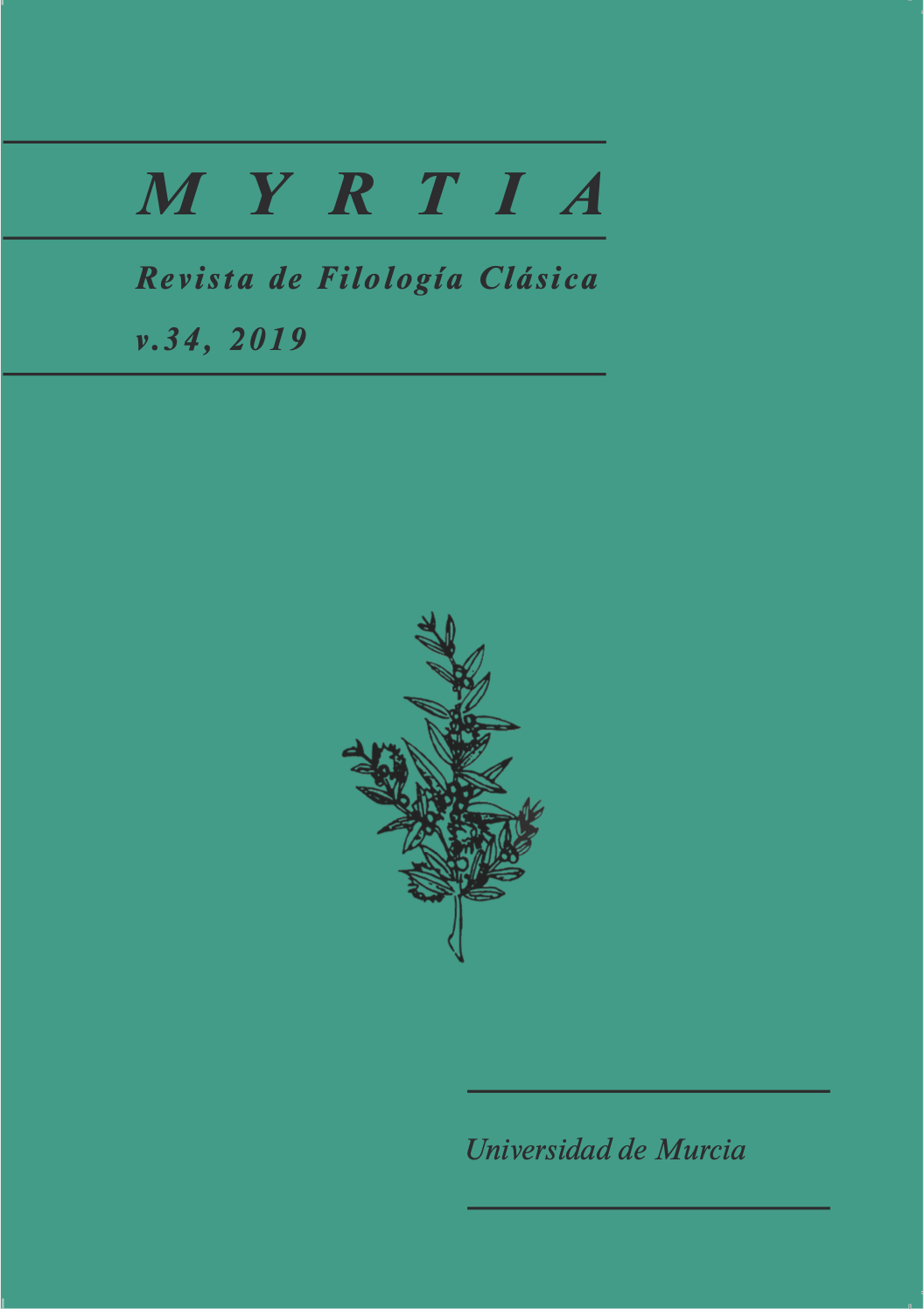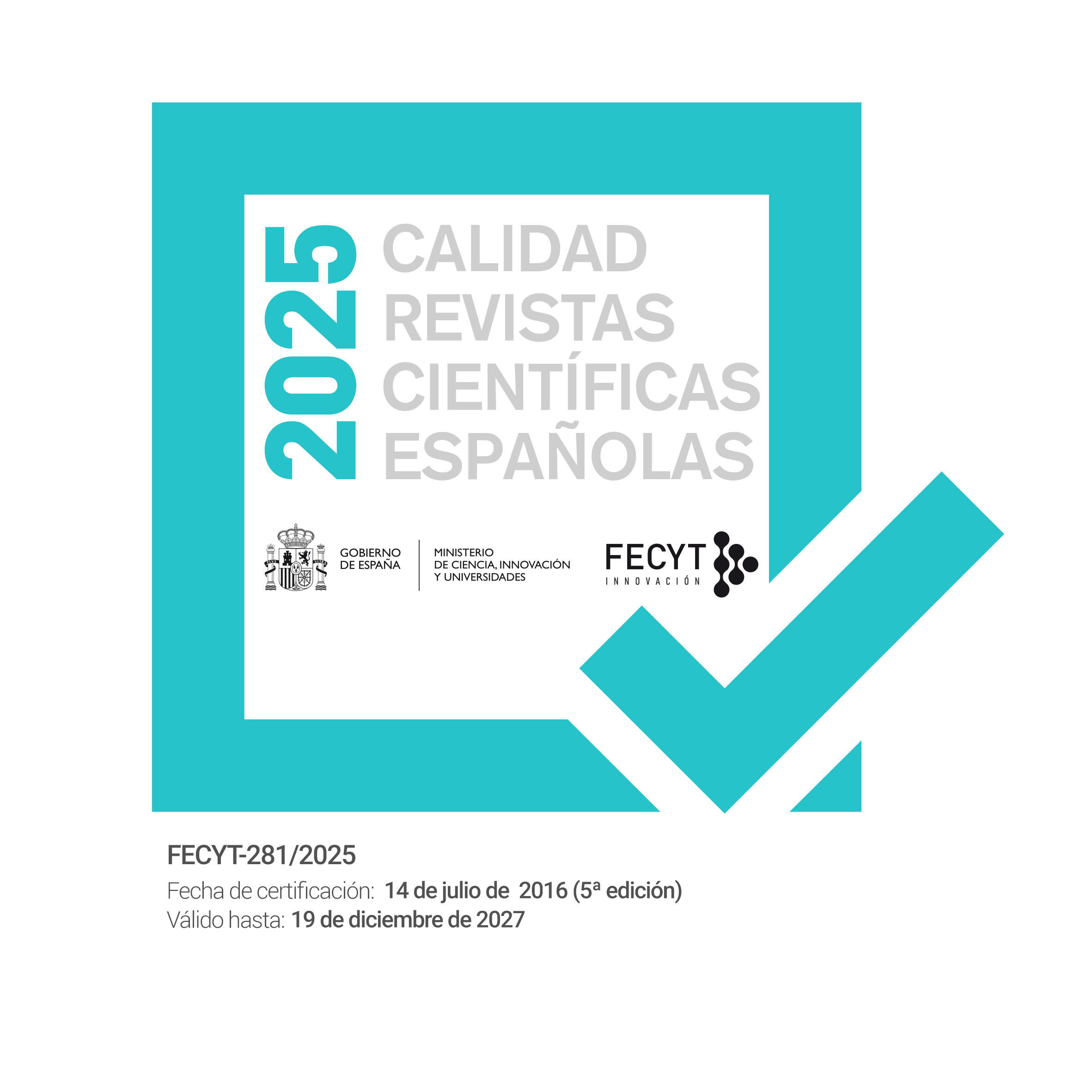The phrase of Pseudartabas (Ar. Ach. 100): Gibberish or Old Persian?
Abstract
In Aristophanes' Acharnians Pseudartabas, an ambassador of the Achaemenid Empire, who greets the Assembly of the Athenians with a verse in an incomprehensible text, is introduced. Several interpretations of the passage have been made on the hypothesis that it responds to a real Old Persian and not a mere succession of syllables that sound like a foreign language. This paper proposes a new interpretation, integrating the message of the Pseudartabas' first intervention with his second phrase, which constitutes the real content of the Persian embassy.
Downloads
-
Abstract533
-
PDF (Español (España))341
References
Álvarez-Pedrosa, J.A. (2015): “Préstamo lingüístico e ideología: el caso de gr. παράδεισος”, en Ὑγίεια καὶ γέλως. Homenaje a Ignacio Rodríguez Alfageme, J. Ángel, J. M. Floristán, F. García Romero, M. López Salvá (eds.), Madrid, pp. 29-41.
Aveline, J. (2000): “Aristophanes Acharnians 95-97 and 100: Persians in the Athenian Assembly”, Hermes 128, pp. 500-501.
Beekes, R. (2010): Etymological Dictionary of Greek, Leiden.
Brandenstein, W. (1964): “Der persische Satz bei Aristophanes, Ἀχαρνῆς, Vers 100”, Wiener Zeitschrift für die Kunde Süd- und Ostasiens 8, pp. 43-58.
Briant, P. (2002): From Cyrus to Alexander: A History of the Persian Empire, Winona Lake, Indiana.
Brixhe, C. (1988): “La langue de l'étranger non grec chez Aristophane”, en L'étranger dans le monde grec, R. Lonis (ed.), Nancy, pp. 113-138.
Brust, M. (2005): Die indischen und iranischen Lehnwörter im Griechischen, Innsbruck.
Chantraine, P. (1968): Dictionnaire étymologique de la langue grecque. Histoire des mots, Paris.
De Jong, A. (1997): Traditions of the Magi. Zoroastrianism in Greek and Latin Literature, Leiden.
Dover, K.J. (1963): “Notes on Aristophanes’ Acharnians”, Maia 15, pp. 6-25. (= K. J. Dover, 1987, Greek and Greeks, Oxford-New York, pp. 289-290).
Dübner, Fr. (1969), Scholia Graeca in Aristophanem, Hildesheim.
Francis, E.D. (1992): “Oedipus Achaemenides”, AJPh 113, pp. 337-340.
Friedrich, J. (1921): “Die altpersische Stelle in Aristophanes Acharnen (V. 100)”, IF 39, pp. 93-102.
García Calvo, A. (1981): Los carboneros (Ἀχαρνεῖς), Madrid.
Gil, L. (1995): Aristófanes. Comedias I. Los acarnienses. Los caballeros, Madrid.
Gnoli, G. (1979): “Ašavan. Contributo allo studio del libro di Ardā Wirāz”, en Iranica, G. Gnoli y A. Rossi (ed.), Napoli, pp. 387-452.
Kent, R. (1950): Old Persian. Grammar, Texts, Lexicon, New Haven, Conneticut.
Koopman, A. (2016): “Ethnonyms”, en The Oxford Handbook of Names and Naming, Oxford, pp. 251-262.
Lecoq, P. (1997): Les inscriptions de la Perse achéménide, Paris.
Long, T. (1986): Barbarians in Greek Comedy, Carbondale.
Margoliouth, D.S. (1887): “Arist. Ach. 100”, CR 1, pp. 204-205.
Meiggs, R. (1972): The Athenian Empire, Oxford.
Meyer, J. (2000): “Humor as a Double-Edged Sword: Four Functions of Humor in Communication”, Communication Theory 10, pp. 310-331.
Miller, M.C. (1997): Athens and Persia in the fifth century BC. A Study in Cultural Receptivity, Cambridge.
Morenilla-Talens, C. (1989): “Die Charakterisierung der Ausländer durch lautliche Ausdruckmittel in den Persern des Aischylos sowie den Acharnern und Vögeln des Aristophanes”, IF 94, pp. 158-176.
Olson, D. (2002): Aristophanes. Acharnians, Oxford.
Porada, E. (1985): “Classical Achaemenid Architecture and Sculpture”, Cambridge History of Iran, vol 2, pp. 793-827.
Rollinger, R. (2006): “The Eastern Mediterranean and Beyond: The Relations between the Worlds of the 'Greek' and 'Non-Greek' Civilizations', en A Companion to the Classical Greek World, K. H. Kinzl (ed.), Malden, Mass, pp. 197-226.
Schmitt, R. (1984): “Perser und Persisches in der alten attischen Komödie”, en Orientalia J. Duchesne-Guillemin emerito oblata, Leiden, pp. 56-85.
Schmitt, R. (2009): Die altpersischen Inschriften der Achaimeniden. Editio minor mit deutscher Übersetzung, Wiesbaden.
Sznycer, M. (1967): Les passages puniques en transcription latine dans le Poenulus de Plaute, Études et commentaires LXV, Paris.
Sommerstein, A.H. (1980): Aristophanes: Acharnians, Warminster.
Van Leeuwen, J. (1901): Aristophanis. Acharnenses cum prolegomenis et commentariis, Lugduni Batavorum.
Vickers, M. (1997): Pericles on stage. Political Comedy in Aristophanes' Early Plays, Austin, Texas.
Wackernagel, J. (1921): “Zu der altpersischen Stelle in Aristophanes' Acharnern”, IF 38, pp. 224.
Wells, J. (1907): “The Persian Friends of Herodotus”, The Journal of Hellenic Studies 27, pp. 37-47.
Welsh, D. (1983): “The Chorus of Aristophanes' Babylonians”, Greek, Roman, and Byzantine Studies 24, pp. 137-150.
West, M.L. (1968): “Two Passages of Aristophanes”, CR 18, pp. 5-8.
Willi, A. (2003): The Languages of Aristophanes. Aspects of Linguistic Variation in Classical Attic Greek, Oxford.
Willi, A. (2004): “Old Persian in Athens Revisited (Ar. Ach. 100)”, Mnemosyne 57, pp. 657-681.
Las obras que se publican en esta revista están sujetas a los siguientes términos:
1. El Servicio de Publicaciones de la Universidad de Murcia (la editorial) conserva los derechos patrimoniales (copyright) de las obras publicadas, y favorece y permite la reutilización de las mismas bajo la licencia de uso indicada en el punto 2.
2. Las obras se publican en la edición electrónica de la revista bajo una licencia Creative Commons Reconocimiento-NoComercial-SinObraDerivada 3.0 España (texto legal). Se pueden copiar, usar, difundir, transmitir y exponer públicamente, siempre que: i) se cite la autoría y la fuente original de su publicación (revista, editorial y URL de la obra); ii) no se usen para fines comerciales; iii) se mencione la existencia y especificaciones de esta licencia de uso.
3. Condiciones de auto-archivo. Se permite y se anima a los autores a difundir electrónicamente las versiones pre-print (versión antes de ser evaluada) y/o post-print (versión evaluada y aceptada para su publicación) de sus obras antes de su publicación, ya que favorece su circulación y difusión más temprana y con ello un posible aumento en su citación y alcance entre la comunidad académica. Color RoMEO: verde.






